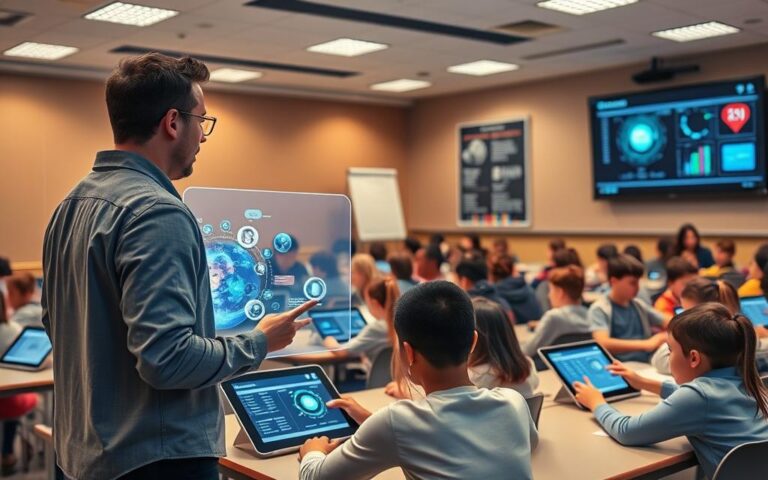Did you know over 70% of jobs need skills not taught in school? This fact shows the need for lifelong learning in today’s fast-changing job world. It’s key for updating education and skills, important for growing personally and professionally. With constant tech advances and industry shifts, learning beyond school is crucial.
Adopting a mindset of continuous learning greatly improves adaptability and success in competitive fields.
Understanding Lifelong Learning
Lifelong learning is an ongoing journey of gaining knowledge that goes beyond regular schooling. It focuses on learning that people choose to do on their own for many reasons. To understand lifelong learning, we look into what it means, its history, and why it’s important today.
Definition and Scope
Lifelong learning means always looking to learn something new for your own or professional growth. It includes formal classes, online courses, workshops, and learning on your own. This idea helps people improve their abilities and stay up-to-date in our world that constantly changes.
Historical Context
Throughout history, the idea of lifelong learning has been part of various educational thoughts. It started with the creation of universities and grew with adult education programs. This growth shows how learning has adapted to meet the needs of society, technology, and the economy.
Importance in Today’s Society
Today, lifelong learning is more important than ever. As jobs and technology change, we need to keep learning to stay ahead. This kind of learning helps with innovation and personal growth. It makes our lives better and more fulfilled.
| Aspect | Importance |
|---|---|
| Adaptability | Embraces changes in technology and job markets. |
| Career Development | Enables individuals to enhance their skills and advance professionally. |
| Social Engagement | Encourages participation in community and networking opportunities. |
| Personal Fulfillment | Contributes to overall happiness and life satisfaction. |
The Benefits of Lifelong Learning
Lifelong learning offers many benefits. It touches on personal growth, career opportunities, and mental health. It goes beyond learning facts, helping individuals develop, advance in careers, and stay mentally healthy.
Personal Development
Lifelong learning deeply impacts personal growth. People who keep learning new things can find out more about themselves and build confidence. They discover what they love and dare to try new things. This makes life more satisfying.
Career Advancement
Continuous learning is essential for moving forward in your career. In today’s fast-paced job market, keeping your skills fresh is key. This can lead to better pay and more job options. Those who keep learning are often the ones who get promoted or smoothly change careers.
Mental Health and Well-Being
Learning all through life is good for your mental health. Research shows that it can reduce stress and anxiety. Lifelong learners are generally happier and find more meaning in life. This improves their social lives and overall health.
| Benefits | Impact on Personal Development | Impact on Career Advancement | Impact on Mental Health |
|---|---|---|---|
| Confidence Boost | Increased self-awareness | Opportunities for promotions | Reduction of anxiety levels |
| New Skill Acquisition | Discovery of passions | Enhanced job prospects | Improved self-esteem |
| Social Connections | Networking with peers | Access to professional communities | Greater fulfillment in life |
Lifelong Learning in the Digital Age
The digital age has changed how we learn for life. Now, education is easier to access than ever. Online courses let people from all walks of life chase their passions and grow their skills. They offer a broad range of topics, helping everyone keep learning.
Online Courses and Platforms
Online courses offer flexibility and tailored learning. Platforms like Coursera, Udemy, and edX give tons of options, from academic subjects to hands-on skills. They are easy to use and allow learners to study at their pace, fitting learning into their hectic schedules.
E-Learning Trends
Today’s e-learning trends aim for flexible and engaging study spaces. Features like video lessons, quizzes, and forums keep learners involved. Such interactivity boosts memory and understanding, positioning e-learning as a solid alternative to traditional schooling.
Accessibility for All
Online education’s biggest perk is its availability to everyone. E-learning sites are built to be open, providing tools for different needs and backgrounds. This open access helps overcome geographical and financial hurdles, making learning lifelong and universal.
Lifelong Learning and Career Growth
Lifelong learning is key to career growth. By always learning and taking part in training, professionals stay ahead. They gain new skills, keeping up with job market changes.
Skills Upgrade for Professionals
One big plus of lifelong learning is better skills. Professionals can get certifications or go to workshops to improve. This makes them ready for new tasks and boosts their work place’s success.
Networking Opportunities
Taking part in courses or seminars helps in networking. This lets professionals meet others in their field, which can help their careers. Networking leads to sharing knowledge and working together.
Competitive Advantage in the Job Market
In today’s tough job market, it’s important to stand out. Lifelong learning gives people an edge with new knowledge and skills. It shows employers you’re all about growing, helping you get good jobs.
The Role of Education Systems
Education systems are key in offering lifelong learning chances in society. They include adult education, community colleges, and corporate training. Each plays a big role in the world of education.
Adult Education Programs
Adult education helps people learn new skills or change career paths. It offers flexible classes to meet adult needs. This makes it easier for adults to keep up with changing job markets.
Community Colleges’ Contribution
Community colleges make getting an education easier and less expensive. They provide degrees and certifications that teach practical skills. By working with local businesses, they make sure their courses meet job needs today.
Corporate Training Initiatives
Corporate training also supports ongoing education. Companies train staff to keep them sharp and competitive. This training promotes a culture of growth, pushing everyone to improve themselves and their work.

Lifelong Learning Across Different Ages
Lifelong learning is important for everyone, no matter their age. It shapes us and society in big ways. For young people, it builds curiosity and important skills. For adults, it offers learning that fits their busy lives. And for retirees, it keeps the mind sharp and helps find new passions.
Encourage Learning in Youth
Helping young people learn is key to a knowledgeable future. Schools and programs should be places where exploring and new ideas are welcome. By offering hands-on learning, like workshops, we help them face future challenges.
Adult Learners and Flexibility
Adults need learning that fits their schedule. They have jobs and families to manage, so regular classes can be hard to attend. Online classes and night courses make learning possible for them. This shows that learning never really stops, even after school.
Retirees Engaging in Learning
More retirees want to keep learning after they stop working. They have classes on many topics, from art to tech, available to them. This lets them meet people and stay sharp. Through colleges or the internet, they can enjoy new hobbies and friends, making life better.
| Age Group | Learning Focus | Preferred Learning Methods |
|---|---|---|
| Youth | Foundational skills & exploration | Interactive workshops & group activities |
| Adults | Career-related skills & personal development | Online courses & flexible schedules |
| Retirees | Hobbies & social engagement | Community classes & online platforms |
Barriers to Lifelong Learning
Lifelong learning has many benefits. Yet, some barriers can stop people from continuing their education. Knowing these obstacles helps promote ongoing learning.
Financial Constraints
Money issues are a big barrier to lifelong learning. The cost of courses and materials is too high for many. This leads to less participation in learning opportunities. Scholarships and financial aid help, but not everyone knows about or can get them.
Time Management Challenges
Managing time is another big hurdle. It’s hard to find time for learning when you have work, family, and personal life. This makes it tough to focus on education goals. Many end up putting off or giving up their learning plans.
Access to Resources
Getting the right resources is key for lifelong learning. But, some can’t reach local schools or programs because of where they live. Also, not knowing about online resources can stop learners. This discourages people from furthering their education and skills.
The Influence of Technology
Technology massively changes how we learn throughout our lives. It offers new tools that make learning interactive and fun. As people look more to technology for help, various platforms meet different learning needs.
Innovative Learning Tools
Virtual reality and interactive simulations make learning complex ideas exciting. These tools combine theory with real-life practice. They let learners move at their pace and get feedback right away. This approach turns old-school classrooms into places for discovery and innovation.
Social Media as a Learning Platform
Social media now helps with learning and connecting. Sites like LinkedIn and Twitter let users share knowledge and support. They offer a community feeling that boosts motivation. Through these platforms, users find valuable resources and join in conversations about new trends.
Gamification in Education
Gamification makes learning similar to playing a game. It uses points and badges to make learning more fun and competitive. This approach inspires students to push themselves. It makes getting knowledge enjoyable and helps develop critical thinking skills needed for lifelong learning.
Lifelong Learning in Diverse Fields
Lifelong learning covers many kinds of knowledge and skills for growth. It’s important for both personal and work life. Many areas offer unique lessons that help everyone find their path.
Technical and Vocational Training
Technical training is key for learning specific job skills. It includes things like plumbing, electrical work, and IT. These programs give real-world skills that meet what companies need. They make people ready for jobs and help fill in skill gaps.
Arts and Humanities
Arts education encourages creativity and critical thinking. It lets students dive into different cultures and self-expression. Studying subjects like literature, history, and art enriches lives and community ties. Adding arts into lifelong learning shapes well-rounded people who value and enrich their worlds.
STEM Education
STEM is vital for our future’s workforce. It focuses on science, technology, engineering, and math. This education helps learners think analytically to innovate and solve problems. With tech always changing, keeping up with STEM is essential. It helps people stay relevant in changing job markets.
Community Involvement in Lifelong Learning
Community involvement is key in supporting lifelong learning for everyone. Local libraries and nonprofit groups are great sources for this. They offer workshops and programs that introduce new ideas and skills. This helps create a strong learning culture for all.
Local Libraries and Workshops
Local libraries are more than book places. They have workshops for many interests, like computer skills or arts. These workshops bring people together to learn in a friendly setting. They make it easy for everyone to learn new things without spending much money.
Nonprofit Organizations
Nonprofits are crucial in making learning reachable for all. They often focus on helping those who don’t have many learning chances. They provide things like tutoring, mentoring, and special courses. This helps people grow and helps the whole community get better. Partnerships with libraries and schools let nonprofits make many learning paths.
Community-Based Learning Groups
Community learning groups help neighbors share knowledge and skills. These groups form strong support networks. Here, everyone pushes each other to grow personally and professionally. They often center on certain interests, making neighborhoods lively learning spots.
Future Trends in Lifelong Learning
The world of lifelong learning is changing fast, with new trends making it easier for people to learn and grow. Over the next ten years, more people will be able to learn because of better policies and more money for education. This change means more of us can keep learning throughout our lives, which is a good thing for everyone.
Changes in policy will help make education available to everyone, not just a few. More money will go to adult education, community colleges, and job training. This will help people of all ages learn new things. Also, learning to be adaptable, communicate well, and solve problems will become more important. Businesses want these skills because the world of work is always changing.
The outlook for lifelong learning is bright, with better access and a focus on important skills. Looking forward, we’ll be more prepared for both our personal and work lives. We’ll adjust better to what society needs. By keeping up with these changes, lifelong learners can succeed in a world that’s more connected than ever.




